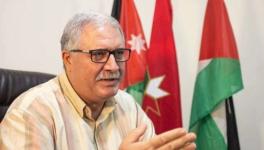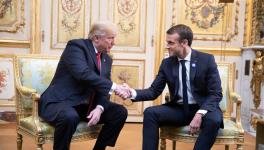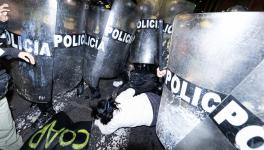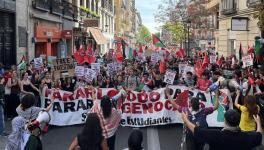What to Expect From European Wave of Palestine Recognition
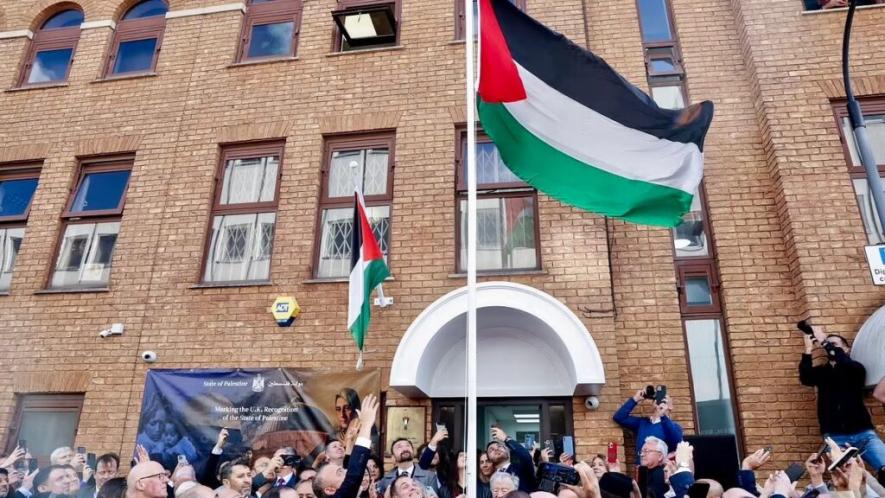
Sinn Féin MLA John O’Dowd joined the historic raising of the Palestinian flag at the new Embassy in London, as the State of Palestine was recognized. Photo: Sinn Féin
Several European countries announced their recognition Palestinian statehood during a session of the United Nations General Assembly on September 22. On the eve of the meeting, British and Portuguese officials made announcements to that effect, joined by Australia and Canada, describing the move as an inalienable part of the path toward a two-state solution. France followed suit on Monday, with Andorra, Belgium, Luxembourg, Malta, and San Marino expected to do the same.
However, these recognitions are likely to include caveats that undermine the officials’ stated intentions. Such disclaimers already accompanied British and Portuguese announcements.
Europe’s vision for Palestine: no Hamas, reformed PA
“A two-state solution, with a safe and secure Israel alongside a viable and sovereign Palestinian state led by a reformed Palestinian Authority, is the only path to a lasting peace for the Israeli and Palestinian people,” said British Foreign Secretary Yvette Cooper. Yet recent statements have focused less on stopping Israel’s genocidal assault than on placating the anticipated anger of Benjamin Netanyahu and his allies. As they explained their decision to recognize a Palestinian state, European leaders once again placed emphasis on condemning Hamas instead of addressing crimes against humanity committed by Israeli forces in Gaza.
“We are clear that Hamas can have no role in Palestine’s future – they are a barbaric terrorist organization who oppose the very idea of two states,” Cooper stated. “They must release the hostages and relinquish any hold on Gaza.” Similar points were echoed by Portuguese and French officials, who argued that recognition would help eliminate Hamas and build a more stable environment for Israel.
As a result, recent European statements expose significant contradictions between the officials’ declared intentions and their policy choices. Cooper, who only weeks ago was Home Secretary, championed the proscription of direct action group Palestine Action, a move that led to hundreds of arrests of peaceful protesters. Today, she frames recognition as support for peace despite having introduced policies that repressed those campaigning for it.
In France, government officials appointed by President Emmanuel Macron – today portrayed in mainstream media as a champion of Europe’s commitment to a two-state solution – failed even to protect elected parliamentarians who joined earlier Freedom Flotilla attempts to break the sea blockade on Gaza. In this light, European recognition of Palestinian statehood, while symbolically impactful, appears less a genuine shift in policy than a move to placate growing public anger over complicity in war crimes.
Demands grow to end ties, arms sales
Solidarity movements across Europe have repeatedly demanded recognition of Palestinian statehood during their campaigns over the past 23 months. Yet they stress that such announcements now come late and risk being reduced to token gestures by governments supporting genocide. During the time it took these leaders to reach a decision and draft their statements, Gaza was reduced to rubble and at least 65,000 Palestinians were killed.
Governments preparing to announce recognition also carry a record of repressing pro-Palestine movements at home. Multiple solidarity groups and activists faced legal attacks not only in Britain, but also in France and Belgium. The recognition of Palestinian statehood at the UNGA makes little sense knowing that the same administrations have attempted to punish people campaigning for peace.
Still, the announcements reflect months of pressure from dozens of campaigns. Solidarity groups across Europe have pointed to the recent wave of recognition as proof that grassroots pressure works and are using it to push for further breakthroughs. In countries still avoiding recognition, demonstrators cite these decisions to bolster their demands.
In the countries that are going to recognize Palestinian statehood during the UNGA high-level week, activists also have a clear picture of their next steps: they are escalating action to cut military ties, halt arms sales, and end complicity in genocide. British MP Jeremy Corbyn emphasized this on Sunday: “Well done to all those who have tirelessly campaigned for the recognition of Palestine — an inalienable right of the Palestinian people. Next, the UK should recognize the genocide in Gaza, end its complicity in crimes against humanity, and stop arming Israel.”
Courtesy: Peoples Dispatch
Get the latest reports & analysis with people's perspective on Protests, movements & deep analytical videos, discussions of the current affairs in your Telegram app. Subscribe to NewsClick's Telegram channel & get Real-Time updates on stories, as they get published on our website.











